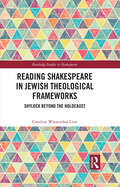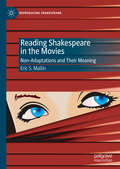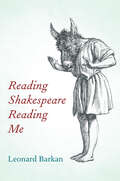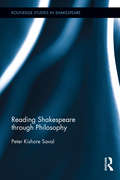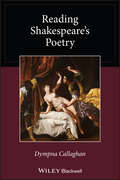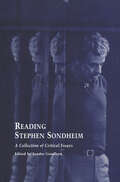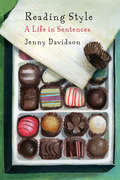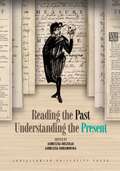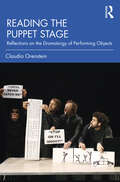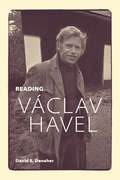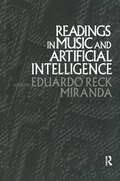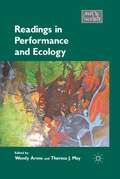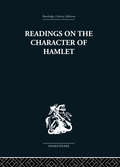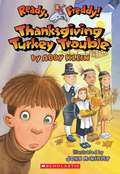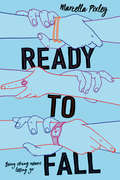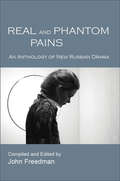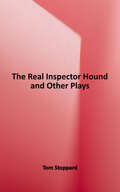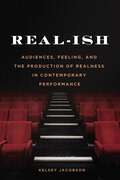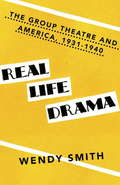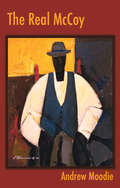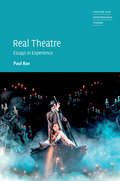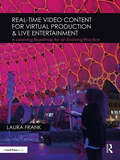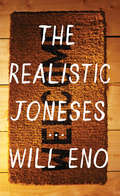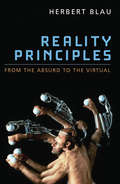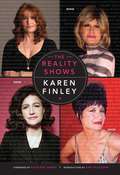- Table View
- List View
Reading Shakespeare in Jewish Theological Frameworks: Shylock Beyond the Holocaust (Routledge Studies in Shakespeare)
by Caroline Wiesenthal LionReading Shakespeare in Jewish Theological Frameworks: Shylock Beyond the Holocaust uses Jewish theology to mount a courageous new reading of a four-hundred-year-old play, The Merchant of Venice. While victimhood and antisemitism have been the understandable focus of the Merchant critical history for decades, Lion urges scholars, performers, and readers to see beyond the racism in Shakespeare's plays by recovering Shakespearean themes of potentiality and human flourishing as they emerge within the Jewish tradition itself. Lion joins the race conversation in Shakespeare studies today by drawing on the intellectual history and oppression of the Jewish people, borrowing from thinkers Franz Rosenzweig and Abraham Joshua Heschel as well as Hannah Arendt, Walter Benjamin, Jacques Derrida, Emmanuel Levinas, and rabbis from the Talmud to today. This volume interweaves post-confessional, Protestant, Catholic, Muslim, Jewish, and mystical ideas with Shakespeare's poetry and opens conversations of prophecy, love, spirituality, care, and community. It concludes with brief critical sketches of Antony and Cleopatra, Hamlet, and Macbeth to demonstrate that Shakespeare when interpreted through Jewish theological frameworks can point to post-credal solutions and transformed societal paradigms of repair that encourage action and the shaping of a finer world.
Reading Shakespeare in the Movies: Non-Adaptations and Their Meaning (Reproducing Shakespeare)
by Eric S. MallinReading Shakespeare in the Movies: Non-Adaptations and Their Meaning analyzes the unacknowledged, covert presence of Shakespearean themes, structures, characters, and symbolism in selected films. Writers and directors who forge an unconscious, unintentional connection to Shakespeare’s work create non-adaptations, cinema that is unexpectedly similar to certain Shakespeare plays while remaining independent as art. These films can illuminate core semantic issues in those plays in ways that direct adaptations cannot. Eric S. Mallin explores how Shakespeare illuminates these movies, analyzing the ways that The Godfather, Memento, Titanic, Birdman, and The Texas Chainsaw Massacre take on new life in dialogue with the famous playwright. In addition to challenging our ideas about adaptation, Mallin works to inspire new awareness of the meanings of Shakespearean stories in the contemporary world.
Reading Shakespeare Reading Me
by Leonard BarkanA gripping, funny, joyful account of how the books you read shape your own life in surprising and profound ways.Bookworms know what scholars of literature are trained to forget: that when they devour a work of literary fiction, whatever else they may be doing, they are reading about themselves. Read Shakespeare, and you become Cleopatra, Hamlet, or Bottom. Or at the very least, you experience the plays as if you are in a small room alone with them, and they are speaking to your life, your sensibility.Drawing on fifty years as a Shakespearean, Leonard Barkan has produced a captivating book that asks us to reconsider what it means to read. Barkan violates the rule of distance he was taught and has always taught his students. He asks: Where does this brilliantly contrived fiction actually touch me? Where is Shakespeare in effect telling the story of my life?King Lear, for Barkan, raises unanswerable questions about what exactly a father does after planting the seed. Mothers from Gertrude to Lady Macbeth are reconsidered in the light of the author’s experience as a son of a former flapper. The sonnets and comedies are seen through the eyes of a gay man who nevertheless weeps with joy when all the heterosexual couples are united at the end. A Midsummer Night’s Dream is interpreted through the author’s joyous experience of performing the role of Bottom and finding his aesthetic faith in the pantheon of antiquity. And the exquisitely poetical history play Richard II intersects with, of all things, Ru Paul’s Drag Race.Full of engrossing stories, from family secrets to the world of the theater, and written with humor and genuine excitement about literary experiences worthy of our attention and our love, Reading Shakespeare Reading Me makes Shakespeare’s plays come alive in new ways.
Reading Shakespeare through Philosophy: Reading Shakespeare Through Philosophy (Routledge Studies in Shakespeare)
by Peter Kishore SavalReading Shakespeare through Philosophy advocates that the beauty of Shakespearean drama is inseparable from its philosophical power. Shakespeare’s plays make demands on us even beyond our linguistic attention and historical empathy: they require thinking, and the concepts of philosophy can provide us with tools to aid us in that thinking. This volume examines how philosophy can help us to re-imagine Shakespeare’s treatment of individuality, character, and destiny, particularly at certain moments in a play when a character’s relationship to space or time becomes an enigma to us. The author focuses on the dramatization of seemingly magical relationships between the individual and the cosmos, exploring and rethinking the meanings of 'individual', 'cosmos' and 'magic' through a conceptually acute reading of Shakespeare's plays. This book draws upon a variety of thinkers including Plato, Aristotle, Leibniz and Kant, in search of a revitalized philosophical criticism of Julius Caesar, Love’s Labor’s Lost, The Merchant of Venice, Timon of Athens, and Twelfth Night.
Reading Shakespeare's Poetry (Wiley Blackwell Reading Poetry)
by Dympna CallaghanReading Shakespeare’s Poetry A lively exploration of Shakespeare’s poems and how they speak to readers Reading Shakespeare’s Poetry presents a fresh interpretation of Shakespeare’s non-dramatic poems, providing insights into the individual poems, their themes and composition, and their relation to the cultural context of Shakespeare’s world. Dympna Callaghan considers what makes Shakespeare’s language poetic and shows how his poetry is comprised not only of lyrical intensity but also of the language of everyday life. Presented chronologically, lucidly-written chapters examine Venus and Adonis, Lucrece, The Phoenix and the Turtle, the Sonnets, and A Lover’s Complaint. Special attention is paid to the distinctive ways in which lineation, rhyme, verse forms, and meter serve to delineate or erase the boundaries of Shakespeare’s poetry. Throughout the book, the author explains how Shakespeare’s language is influenced by predecessors such as Ovid and Petrarch while highlighting how ideas about the social and cultural function of poetry permeate Shakespeare’s works. Offers an eminently readable yet scholarly exploration of the literary importance of Shakespeare’s poems Explains the technical features of Shakespeare’s poetic language Addresses the significance of the material form in which Shakespeare’s poems appear Includes a discussion of songs, poems, and sonnets embedded in Shakespeare’s dramatic verse Reading Shakespeare’s Poetry is both a fresh and indispensable guide to the poems and a significant critical intervention. This is a must-have book for scholars, students, and general readers alike.
Reading Stephen Sondheim: A Collection of Critical Essays (Studies in Modern Drama #Vol. 10)
by Sandor GoodhartFirst Published in 2000. Routledge is an imprint of Taylor & Francis, an informa company.
Reading Style
by Jenny DavidsonA professor, critic, and insatiable reader, Jenny Davidson investigates the passions that drive us to fall in love with certain sentences over others and the larger implications of our relationship with writing style. At once playful and serious, immersive and analytic, her memoir/critique shows how style elicits particular kinds of moral judgments and subjective preferences, which turn reading into a highly personal and political act.Melding her experiences as reader and critic, Davidson opens new vistas onto works by Jane Austen, Henry James, Marcel Proust, and Thomas Pynchon; adds richer dimension to critiques of W. G. Sebald, Alan Hollinghurst, Thomas Bernhard, and Karl Ove Knausgaard; and allows for a sophisticated appreciation of popular fictions by Stephen King, Neil Gaiman, Lionel Shriver, George Pelecanos, and Helen DeWitt. She privileges diction, syntax, point of view, and structure over plot and character, identifying the intimate mechanics that draw us in to literature's sensual frameworks and move us to feel, identify, and relate. Davidson concludes with a reading list of her favorite titles so others can share in her literary adventures and get to know better the imprint of her own reading style.
Reading the Past, Understanding the Present
by Agnieszka Orszulak Agnieszka RomanowskaReading the Past, Understanding the Present is a collection of essays written by students from nine European universities, who took part in the Strategic Partnership, “Facing Europe in Crisis: Shakespeare’s World and Present Challenges,” aiming to promote historical understanding of the crises plaguing the contemporary Europe and the world. In each chapter, the authors examine early modern theatre, the works by William Shakespeare in particular, and how it interacts with various local and global issues, reflecting on their cultural and socio-political origins and consequences. This book offers an innovative insight into the relationship between the past represented in such plays as The Merchant of Venice, King Lear, The Tempest</i, or the history plays and the complex contemporary European context – migrant crisis, racial diversity, democracy, or the Covid-19 pandemic.
Reading the Puppet Stage: Reflections on the Dramaturgy of Performing Objects
by Claudia OrensteinDrawing on the author’s two decades of seeing, writing on, and teaching about puppetry from a critical perspective, this book offers a collection of insights into how we watch, understand, and appreciate puppetry. Reading the Puppet Stage uses examples from a broad range of puppetry genres, from Broadway shows and the Muppets to the rich field of international contemporary performing object experimentation to the wealth of Asian puppet traditions, as it illustrates the ways performing objects can create and structure meaning and the dramaturgical interplay between puppets, performers, and language onstage. An introductory approach for students, critics, and artists, this book underlines where significant artistic concerns lie in puppetry and outlines the supportive networks and resources that shape the community of those who make, watch, and love this ever-developing art.
Reading Václav Havel
by David S. DanaherAs a playwright, a dissident, and a politician, Václav Havel was one of the most important intellectual figures of the late twentieth century. Working in an extraordinary range of genres - poetry, plays, public letters, philosophical essays, and political speeches - he left behind a range of texts so diverse that scholars have had difficulty grappling with his oeuvre as a whole.In Reading Václav Havel, David S. Danaher approaches Havel's remarkable body of work holistically, focusing on the language, images, and ideas which appear and reappear in the many genres in which Havel wrote. Carefully reading the original Czech texts alongside their English versions, he exposes what in Havel's thought has been lost in translation. A passionate argument for Havel's continuing relevance, Reading Václav Havel is the first book to capture the fundamental unity of his vast literary legacy.
Readings in Music and Artificial Intelligence (Contemporary Music Studies #20)
by Eduardo Reck MirandaFirst published in 2000. Routledge is an imprint of Taylor & Francis, an informa company.
Readings in Performance and Ecology
by Wendy Arons Theresa J. MayThis ground-breaking collection focuses on how theatre, dance, and other forms of performance are helping to transform our ecological values. Top scholars explore how familiar and new works of performance can help us recognize our reciprocal relationship with the natural world and how it helps us understand the way we are connected to the land.
Readings on the Character of Hamlet: compiled from over three hundred sources.
by Claude C WilliamsonFirst published in 1950. This volume contains the essence of over three hundred well-known literary critics who, between 1661 and 1947, considered the great literary riddle of the years · Entries arranged chronologically by date of publication· International authorship of material
Ready, Freddy! Thanksgiving Turkey Trouble (Ready, Freddy! #(#15))
by Abby KleinWould you believe being a turkey for the first grade Thanksgiving play will get Freddy locked up in jail? Freddy believes it. In fact he believes all kinds of terrible things will happen if he has to dress up as a turkey for the play. <P><P> At school there's teasing, bullying, copy-catting, tattling, joking, arguments, laughing, time-outs and all kinds of kid and teacher stuff you've had in your own school. At home, there's teasing from Freddy's sister and understanding from his mom, but they don't help him get over having to be the turkey. <P><P>Finally, just in time, Freddy learns a trick that will make being a turkey fun! At the end of the story are some ideas for Thanksgiving crafts.
Ready to Fall: A Novel
by Marcella PixleyA young adult novel about a teen who finds hope and a fresh start after a terrible loss, and learns that being strong means letting go.When Max Friedman’s mother dies of cancer, instead of facing his loss, Max imagines that her tumor has taken up residence in his brain. It's a terrible tenant—isolating him from family, distracting him in school, and taunting him mercilessly about his manhood. With the tumor in charge, Max implodes, slipping farther and farther away from reality. Finally, Max is sent to the artsy, off-beat Baldwin School to regain his footing. He joins a group of theater misfits in a steam-punk production of Hamlet where he becomes friends with Fish, a girl with pink hair and a troubled past, and The Monk, an edgy upperclassman who refuses to let go of the things he loves. For a while, Max almost feels happy. But his tumor is always lurking in the wings—until one night it knocks him down and Max is forced to face the truth, not just about the tumor, but about how hard it is to let go of the past. At turns lyrical, haunting, and triumphant, Ready to Fall is a story of grief, love, rebellion and starting fresh from acclaimed author Marcella Pixley.
Real and Phantoms Pains: An Anthology of New Russian Drama
by John FreedmanAn anthology of ten plays embodying the Russian literary movement that began in the late twentieth century. The plays selected for this anthology reflect the issues and styles typical of the new wave of dramatic writing in Russia. New drama flourished (almost) exclusively in small spaces, often in dingy basements that employed and accommodated small numbers of people. The big theaters largely turned a blind eye to what was happening on small stages and in backrooms in playhouses, libraries, and community centers in a few chosen hot spots around Russia: primarily Moscow, Yekaterinburg and Togliatti. In many cases, they took actively hostile stances toward it. This would change, however. And by the beginning of the century&’s second decade, new drama was threatening to become a mainstream phenomenon. Not every theater staged plays associated with new drama, but almost every one began staging plays influenced by the themes, methods, and language of the new drama movement. Featuring work from Yury Klavdiev, Olga Mukhina, Pavel Pryazhko, Vasily Sigarev, Maksym Kurochkin, Mikhail Durnenkov, Vyacheslav Durnenkov, Yaroslava Pulinovich, Yelena Gremina, and Maxim Osipov.&“Few people know more about what is happening on the Moscow scene than John Freedman (including few Russians). As Moscow Times theater critic throughout the post-Soviet period John could well have seen more theatrical productions in Russia than anyone else. I can&’t imagine anyone who would do a better job.&” —Blair A. Ruble, Director, Program on Global Sustainability & Resilience, Woodrow Wilson Center&“While other existing volumes focus on 18th, 19th, and early 20th century Russian drama, Freedman&’s edition would present the unique and important contributions of the new generation of Russian writers portraying the realities and experiences of a post-Soviet generation. John has carefully selected a representative cohort of ten of the most visible, productive, and influential of these writers for the volume.&” —Thomas J. Garza, University Distinguished Teaching Associate Professor, University of Texas at Austin
Real Inspector Hound and Other Plays
by Tom StoppardCulled from nearly 20 years of the playwright's career, a showcase for Tom Stoppard's dazzling range and virtuosic talent, The Real Inspector Hound and Other Plays is essential reading for fans of modern drama. The plays in this collection reveal Stoppard's sense of fun, his sense of theater, his sense of the absurd, and his gifts for parody and satire. They include The Real.
Real-ish: Audiences, Feeling, and the Production of Realness in Contemporary Performance
by Kelsey JacobsonIn the “post-truth” era, the question of how people perceive things to be real, even when they are not based in fact, preoccupies us. Lessons learned in the theatre – about how emotion and affect produce an experience of realness – are more relevant than ever.Real-ish draws on extensive interviews with audience members about their perceptions of realness in documentary, participatory, historical, and immersive performances. In studying these forms that make up the theatre of the real, Kelsey Jacobson considers how theatrical experiences of realness not only exist as a product of their real-world source material but can also unfurl as real products in their own right. Using the concept of real-ish-ness – which captures the complex feeling that is generated by engaging with elements of reality – the book examines how audiences experience the apparently real within the time and space of a performance, and how it is closely tied to the immediacy and intimacy experienced in relation to others.When feeling – rather than fact –becomes a way of knowing truths about the world, understanding the cultivation and circulation of such feelings of realness is paramount. In exploring this process, Real-ish centres audience voices and, perhaps most importantly, audience feelings during performance.
Real Life Drama
by Wendy SmithReal Life Drama is the classic history of the remarkable group that revitalized American theater in the 1930s by engaging urgent social and moral issues that still resonate today. Born in the turbulent decade of the Depression, the Group Theatre revolutionized American arts. Wendy Smith's dramatic narrative brings the influential troupe and its founders to life once again, capturing their joys and pains, their triumphs and defeats. Filled with fresh insights into the towering personalities of Harold Clurman, Lee Strasberg, Cheryl Crawford, Elia Kazan, Clifford Odets, Stella and Luther Adler, Karl Malden, and Lee J. Cobb, among many others, Real Life Drama chronicles a passionate community of idealists as they opened a new frontier in theater.
The Real McCoy
by Andrew MoodieElijah McCoy, born in Canada to runaway American slaves, showed so much promise in school that he won a scholarship to study mechanical engineering at Edinburgh University. McCoy moved to the US, where no one believed a black man could be an engineer and so he was set to stoking boilers. Nevertheless, McCoy devised a solution to one of the greatest problems facing steam locomotion that was sold worldwide with the marketers' proviso that McCoy's race be concealed.
Real Theatre: Essays in Experience (Theatre and Performance Theory)
by Paul RaeTheatre is often said to offer unique insights into the nature of reality, but this obscures the reality of theatre itself. In Real Theatre, Paul Rae takes a joined-up approach to the realities of theatre to explain why performances take the forms they do, and what effects they have. Drawing on examples ranging from Phantom of the Opera and Danny Boyle's Frankenstein, to the performances of the Wooster Group and arthouse director Tsai Ming-liang, he shows how apparently discrete theatrical events emerge from dynamic and often unpredictable social, technical and institutional assemblages. These events then enter a process of cultural circulation that, as Rae explains, takes many forms: fleeting conversations, the mercurial careers of theatrical characters and the composite personae of actors, and high-profile products like the Hollywood movie Birdman. The result is a real theatre that speaks of, and to, the idiosyncratic and cumulative experience of every theatre participant.
Real-Time Video Content for Virtual Production & Live Entertainment: A Learning Roadmap for an Evolving Practice
by Laura FrankReal-Time Video Content for Virtual Production & Live Entertainment looks at the evolution of current software and hardware, how these tools are used, and how to plan for productions dependent on real-time content. From rock concerts to theatre, live television broadcast to film production, art installations to immersive experiences, the book outlines the various applications of real-time video content – the intersection of gaming and performance that is revolutionizing how films are made and how video content is created for screens. Rather than render out a fixed video file, new tools allow for interactive video content that responds to audience activity, camera position, and performer action in real time. Combining software renderers with environmental information, video content is generated nearly instantaneously to simulate depth, creating a new world of Virtual Production. This book provides an overview of the current software and hardware used to create real-time content while also reviewing the various external technologies the real-time content is dependent upon. Case studies from industry experts appear in each chapter to reinforce the tools described, establish industry practice, and provide insight on a complex and rapidly growing discipline. Real-Time Video Content for Virtual Production & Live Entertainment prepares students and practitioners for a future working with real-time technologies and informs current entertainment technology professionals how to rethink about their old roles using these new tools. The book includes access to a companion website featuring web-based and video resources that expand on topics covered in the text. Each chapter has a unique page that points to example material, video presentations, and professional studies on chapter topics. You can visit the companion website at rtv-book.com.
The Realistic Joneses
by Will Eno"[A] tender, funny, terrific new play. . . . Mr. Eno's voice, which teases out the poetry in the pedestrian and finds glinting humor in the static that infuses our faltering efforts to communicate, is as distinctive as any American playwright's today."--The New York Times"Weird and wonderful . . . Eno's familiar sudden-shifting between profound and playful verbiage is delightfully disarming and sometimes awfully funny."--Variety"Plays as funny and moving, as wonderful and weird as The Realistic Joneses... do not appear often on Broadway. Or ever, really.... Mr. Eno's voice may be the most singular of his generation, but it's humane, literate and slyly hilarious.... For all the sadness woven into its fabric, The Realistic Joneses brought me a pleasurable rush virtually unmatched by anything I've seen this season." - The New York Times"As usual, Eno's dialogue is a marvel of compression and tonal control, trivial chitchat flipping into cosmic profundity with striking ease.... There's much to savor: the dry but meaningful banter, the joy of humans sharing time and space, battling the darkness with a joke or silence. Life in Enoland isn't what you'd call realistic--it's more real than that." - Time Out New York "[An] elliptical, funny, dark and strangely moving new play.... Eno is a writer with heart and compassion." - Chicago Tribune"Eno's first-ever commercial foray ups the creative ante in a Broadway climate that can be resistant to new voices.... [A] very fine play where laughter exists a heartbeat, or heartbreak, away from tears." - The TelegraphMeet Bob and Jennifer and their new neighbors John and Pony, two suburban couples who have more in common than their identical last names. Boasting the playwright's quintessential existential quirkiness, this new comedy finds poetry in the banal while humorously exploring our ever-floundering efforts at communication. Listed as one of New York Times's Best Plays of 2012, The Realistic Joneses received its Broadway premiere in spring 2014, starring Toni Collete, Michael C. Hall, Tracy Letts and Marisa Tomei, and opening to rave reviews.Will Eno is the author of Thom Pain (based on nothing), which ran for a year Off-Broadway and was a 2005 Pulitzer Prize finalist. Other works include Middletown, The Flu Season, Tragedy: a tragedy, Intermission, and Gnit, an adaptation of Henrik Ibsen's Peer Gynt. His many awards include the PEN/Laura Pels International Foundation for Theatre Award, the Horton Foote Prize, and the first-ever Marian Seldes/Garson Kanin Fellowship by the Theater Hall of Fame.
Reality Principles: From the Absurd to the Virtual
by Herbert Blau"Herbert Blau’s long sustained inquiry into theater’s most provocative questions-presence, liveness, and finitude-are, at their deepest level, queries into life. Reality Principlesreturns us to Blau’s inspiring provocations and extends them to new subjects-9/11 and Ground Zero, the nature of charisma, Pirandello and Strindberg. ” -Peggy Phelan, Stanford University Reality Principlesgathers recent essays by esteemed scholar and theater practitioner Herbert Blau covering a range of topics. The book’s provocative essays-including "The Emotional Memory of Directing,” "The Faith-Based Initiative of the Theater of the Absurd,” "Virtually Yours: Presence, Liveness, Lessness,” "The Human Nature of the Bot”-were given as keynotes and/or memorial lectures and are collected here for the first time. The essays take up a remarkable array of topics-from body art and the self-inflicted punishments of Stelarc, Orlan, and the Viennese Actionists, to Ground Zero and 9/11-and allow Blau to address critical questions of theater and theory, performance and relevance, the absurd and the virtual, history and illusion, community and memory. Reality Principlesoffers a panoramic view of Herbert Blau’s perspectives on life and the imitation of life on stage.
The Reality Shows
by Ann Pellegrini Karen Finley Kathleen Hanna"Ms. Finley hasn't lost the power to disturb."-Ben Brantley, The New York TimesNo other contemporary performing artist has captured the psychological complexity of this decade's political and social milestones as Karen Finley has in the past ten years. In her inimitable style, Finley has embodied some of the most troubling figures to cast a long shadow on the public imagination, and has envisioned a kind of catharsis within each drama: Liza Minnelli responds to the September 11 attacks; Terri Schaivo explains why Americans love a woman in a coma; Martha Stewart dumps George W. Bush during their tryst on the eve of the Republican National Convention; Silda Spitzer tells the former governor why "I'm sorry" just isn't enough; Jackie O cries, "Please stop looking at me!"The Reality Shows is a revelation of a decade by one of our greatest interpreters of popular and political culture.Karen Finley's raw and transgressive performances have long provoked controversy and debate. She has appeared and exhibited her visual art, performances, and plays internationally. The author of many books, including A Different Kind Of Intimacy, George & Martha, and Shock Treatment, she is a professor at the Tisch School of Art and Public Policy at NYU.Kathleen Hanna, activist and writer, was the lead singer of the punk band Bikini Kill before fronting the dance-punk band Le Tigre. She released a solo album under the name Julie Ruin.
